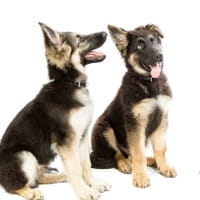FYI: If you buy something through a link on this site I may earn a commission - at NO extra cost to you.
Puppy Development Guide
Seeing the various stages of puppy development is both fun, and fascinating.
Puppies are babies and just like human babies they're going to go through a lot of different phases and stages on their way to adulthood.... but you have a shorter period in which to hone your parenting skills!
Knowing what you can reasonably expect from your puppy (and what he simply isn't capable of yet) is hugely important, because it not only eliminates some frustrations, but also ensures that your little guy gets exactly what he needs from you.
Puppy Development Stages
Every puppy is a unique individual - a furry little bundle of needs/wants/instincts and genes - and as he grows and you learn more about his personality you'll find it easier to meet his needs.
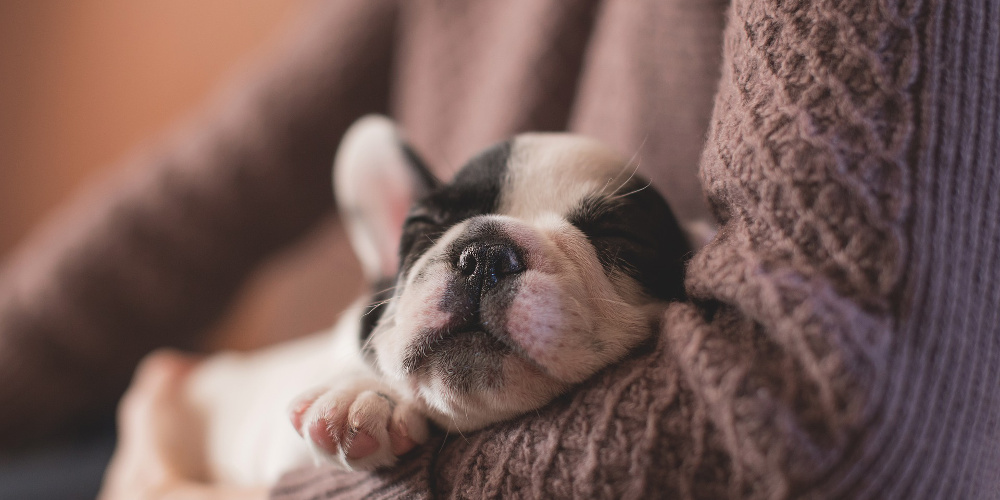
Large and giant breed puppies grow and mature much more slowly than small or toy breeds, which means that the ages at which puppies of different breeds/sizes go through each stage of development can vary a bit.
The first 8 weeks of life are pretty standard for all pups, but after that - not so much.
There are three types of changes which puppies go through as they mature:
- Physical developments
- Emotional developments
- Growth and weight gain
There are also four Fear Periods that puppies can experience between birth and adulthood.
Some are more noticeable than others, and not all puppies become fearful during all fear periods.
However, if you notice your pup seems to be afraid of things he was previously confident about, or becomes socially shy or generally more cautious, chances are he's going through one of them.
The Fear Periods show up during these approximate time frames:
- First Fear Period 8-10 weeks of age
- Second Fear Period 4-6 months of age
- Third Fear period 9-10 months of age
- Fourth Fear Period 14-18 months of age
These are approximate timeframes because puppies grow at different rates and mature at different ages, depending on breed and size.
Puppy Development During Pregnancy
If you want to learn all about canine pregnancy, and how puppies develop during the 9 weeks they spend in the womb, check out this page.... Dog Pregnancy
First Stage: 0 - 3 weeks
This stage of puppy development is the very beginning of your puppy's life and he's a tiny, vulnerable creature!
Take a look at some puppies being born and you'll see exactly what I mean...
This stage includes the Neonatal Period (birth - 2 weeks) when puppies are totally dependent on the mother dog, and the Transitional Period (2-3 weeks) when they begin to take part in social interactions between themselves and respond to outside stimuli.
Puppies are born with their eyes and ears firmly closed and without any teeth.
Although you won't see much external activity in a puppy during this period (all they want to do is eat and sleep), there's a LOT going on inside.
In fact this is a very critical stage of puppy development and all that sleeping is actually playing an important role as puppies do most of their growing during that time.
Towards the end of this period a puppy will begin to open his eyes (at around 2 weeks old) and his ears (at around 3 weeks old), then his baby teeth (aka milk teeth) will start to peek through his gums.
His eyesight and hearing improve daily, and by the time he's 3 weeks your pup will have taken his first steps and be toddling around, trying out his voice and beginning to play with his siblings.
Your Puppy's Needs During the First Stage of Development:
Obviously right now your puppy is with his momma and siblings, so the breeder has full responsibility for him.
If you have puppies who have been abandoned or rejected by their momma, or are orphans, they will need you to take care of them by bottle feeding (or tube feeding) them and helping them to maintain their body temperature.
My Caring For New Born Puppies page has all the tips, advice and information you need to do this properly.
It's a good time for him/her to begin to introduce new things for the puppies to experience and help to stimulate their senses.... such as different textures for them to feel (ie. wear different clothing for them to be held against, different surfaces to toddle about on, brush their fur gently and so on).
Different sounds can be introduced such as the radio, tv, washing machine etc.
To help you see how little ones behave during this period of puppy development, here are some adorable 3 week old Cavalier King Charles Spaniel puppies... awwww....
Second Stage: 4 - 11 Weeks
During the second stage of puppy development little Fido will grow very quickly and will mature at the same pace.
This stage includes the Socialization Period (approx. 3-12 weeks). This is a critical period of a puppy's development and what he learns, and the new experiences he has during this stage will have an impact throughout his lifetime.
He will start to regulate his own temperature during this period, and also start to feel the urge to pee/poop all by himself so he won't need his momma, or you, to stimulate him to eliminate any more.
Your puppy is a now a 'toddler' and he'll be very busy learning how to interact with other dogs (both puppies and older dogs) and with other animals and, of course, humans. His social skills will improve in leaps and bounds during this stage.
Your puppy's teeth start to emerge during this stage and this means that he doesn't have to rely on drinking milk as his sole source of nutrition.. but he can't switch straight from nursing to eating dry kibble at this point.
His momma will start to wean him by refusing to let him nurse for long periods. In the wild a wolf or wild dog will regurgitate food for her puppies, the ultimate 'baby food'.
You don't see this often in domesticated dogs, but some females do it and it's not to be confused with vomiting!
There's a lot to be learned from their momma during this stage of puppy development. She'll teach him basic 'canine manners' and he will follow her lead in terms of how he reacts to the people and situations he encounters.
A calm, well-behaved momma dog will usually raise calm, well-behaved puppies but a fearful or aggressive momma may transmit those behaviors to her offspring.
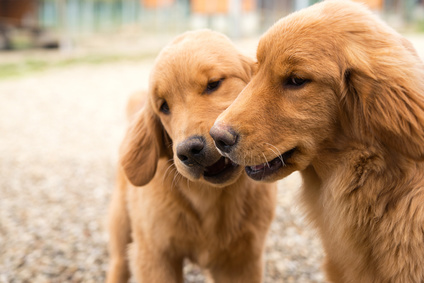
A puppy will also learn from his litter mates, and one of the
most important lessons is 'bite inhibition' - this is basically how hard
he can bite without getting in deep trouble!
This lesson is very important and just one of the many reasons why puppies should remain with their canine families for at least 8 weeks.
Your Puppy's Needs During the Second Stage of Development:
During this developmental stage, breeders need to continue increasing the pup's exposure to different textures, sounds, smells etc.
Individual puppies can be given short periods away from their momma and siblings to help them get used to being separated. This is a small step towards helping a puppy feel less frantic when he has to leave his doggie family to go to a new home.
Also because this is the time when a momma dog will start to wean her pups naturally, breeders also need to start the weaning process (the transition from drinking only milk to eating solid food) by supplementing the pups diet with a premium puppy kibble soaked in warm water... and offering the puppies water to lap.
Just because the momma isn't feeding her puppies that doesn't mean they are ready to go to new homes... if anyone tells you this they do NOT have those puppies best interests at heart!
And to finish off, during this period of puppy development they should also get their first set of puppy shots and be treated for puppy worms by a veterinarian before the end of this period of puppy development.
Here are the same puppies as shown in the video above, at 7 weeks old. See how much bolder and more playful they are!...........
Third Stage: 7 - 12 Weeks
That little puppy has grown up pretty quickly and by 8 weeks old he's ready to leave his canine family and go to his new home.
Tiny breeds may mature more slowly and it's better to keep these pups with their momma for up to 10 - 12 weeks.
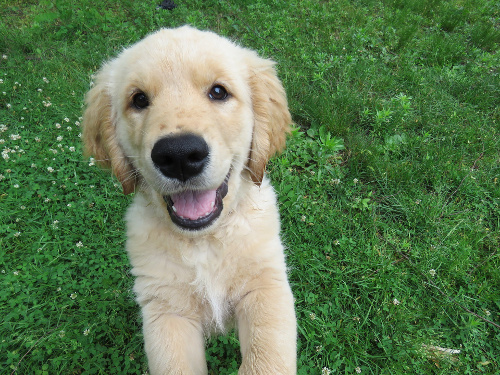
He may be a little guy, but a puppy of this age is curious, outgoing and intelligent. He's ready to find out all about the world around him and is eager to please his people.
Right now your puppy is the proverbial 'blank slate' and it's easiest time to teach and train your puppy.
He's small enough to control, eager to learn and respects you as his 'leader'. What he learns now will stay with him for life - good or bad - so make it good!
Socialization is also very important during this stage of puppy development... the more new sights, sounds, smells etc. that he can experience the better. Positive experiences will build his self confidence.
Puppies who have lots of socialization experiences and stimulus during this period will be much better equipped to handle change as they grow.
Countless studies have shown that the best time for a pup to leave his momma and go to his new home is right around 8 weeks of age, so during this stage a puppy often moves to his 'forever home' and family.
Many new owners aren't sure what to expect at first and there is often an adjustment period, you can learn more about the first few days/week with a new puppy on my Bringing Home A New Puppy page.
There is also the first 'fear period' to deal with. This usually comes on during the third stage of puppy development and at around 8 weeks of age. Little Fido may suddenly seem to be scared of his own shadow, wanting to stick close to you at all times.
Your Puppy's Needs During the Third Stage of Development :
He's about to take off on a huge learning curve, so it's the perfect time to start introducing your little guy to some basic manners and puppy training. Start short, basic obedience training sessions at home, and then move onto a formal obedience class once he's fully vaccinated.
What you feed your puppy will have a long-term impact on his health and longevity. Feeding one of the best puppy food choices available is a big step towards keeping him happy and healthy, and growing at the proper rate.
It's also vital to balance his need for socialization against health risks. Your puppy is very vulnerable to disease at this point in his life, so NEVER allow an unvaccinated puppy to interact with other pups or dogs who are not FULLY immunized.. also don't give him access to any public areas such as parks, stores, sidewalks etc.
Any fearful reactions are pretty normal at this age, and are usually nothing to worry about. You don't want to 'coddle' a pup who is behaving this way. Just maintain a positive attitude and use a happy, upbeat tone of voice so that he realizes there is nothing to be scared of.
Also, never push your pup to do something that he's clearly terrified of - that will cause more problems than it will solve.
How Big Will My Puppy Get?
The majority of puppies go to their new homes during this stage, and one of the questions I hear most often is 'How big is my puppy going to be when he's fully grown?' Check out these pages for more info.
Fourth Stage: 12 - 17 Weeks
This period of puppy development is kind of like the 'tween' or 'pre-teen' stage that our human kids go through.
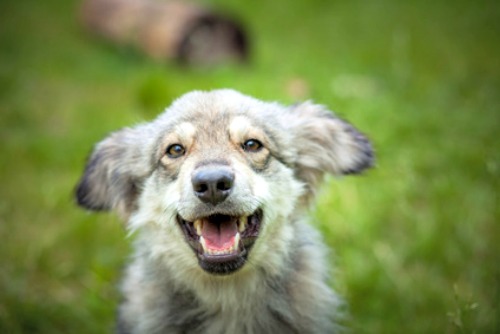
Your pup isn't a baby any longer, but he's not really an adolescent either, he's in that no-man's land and you're not the only one who's confused about what he can, or should, be doing!
His confidence is growing by leaps and bounds, but he can unexpectedly slip back into that 'anxious little puppy' mode at any time.
One minute he's all bold and brave and barking at the neighbor's cat, next minute he's trying his best to be invisible - or failing that, hide behind your legs.
For small breed puppies that super-growth spurt he's been experiencing will start to slow down, and his appetite will slow down right along with it.
Larger breeds are still much less mature though and will likely continue to eat you out of house and home for a while longer.
All in all this is a time of transition for your little guy, and his behavior will probably be inconsistent, confusing and maybe even frustrating.
If he's a bit of a challenge rest assured this is normal, and he will grow out of it (but he's got a fair way to go yet!)
Your Puppy's Needs During the Fourth Stage of Development:
Puppies need firm guidelines and lots of love during this stage of development, and the ones to come!
He'll be starting to venture further afield and his growing confidence will sometimes push him out of his comfort zone (now and then WAY out of it) and he's likely to be a bit confused by his feelings and reactions.
He needs you to be calm and patient so that he doesn't get over-anxious or into trouble.
Socialization is a very important part of this stage, and now that he's fully vaccinated your pup can be going out and about with you as much as possible. It's also the ideal time to get him started on formal obedience classes, if you haven't already done so.
Continue his socialization, going to new places, meeting new dogs (and people) and having new experiences. Socialization is a lifelong activity!
Everything he learns and experiences while young will stay with him, and although the old saying 'You can't teach an old dog new tricks' isn't really true, it IS true that it's much easier to teach things to a puppy or younger adult dog :)
Fifth Stage: 18 - 40 Weeks
Congratulations you're raising a teenager!
The fifth stage of puppy development is pretty close to the human 'teenage' years and you'll see a lot more of the 'bratty' attitudes you've probably already been dealing with.
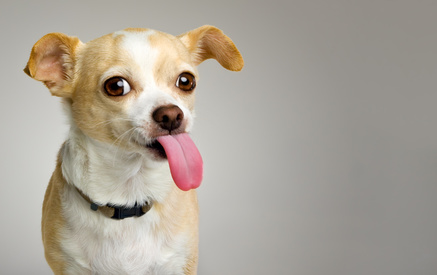
This teen puppy stage can be pretty demanding and more than a little challenging.
Your pup will want to break the rules, test the limits (and your patience) and generally act as though he's forgotten every lesson you ever taught him.
PLUS, there's another fear period and he'll also be in the middle of teething as well.
Yikes!
But don't worry, this is perfectly normal and you don't have a juvenile delinquent on your hands.. yet anyway. If you've followed the advice above during the earlier stages of puppy growth you can relax :)
Rest assured that as long as you continue to set (and enforce with love) the 'house rules' and keep your routine and reactions consistent, your pup will come through this rocky period and emerge as an older, and hopefully wiser, version of that little 8 week old furball.
But, if you haven't done the groundwork yet - then you've got some work ahead of you and you'd better start right now!
Continue to be patient and consistent with him. Some strong-willed pups may try to 'show you who's boss', but it's important to make sure that you stay in charge.
In terms of physical puppy development, your pup will likely look like a teenager as well... long limbs, slender, maybe a bit awkward and ungainly. All normal and you may find his appetite will fluctuate as he goes through growth spurts.
During this period your pup should lose his last puppy teeth (the front 'fangs' or upper canines) and will have a full set of permanent teeth.
Your Puppy's Needs During the Fifth Stage of Development:
At this stage of puppy development, your pup's greatest needs are for discipline, exercise, sturdy chew toys... and patience!
Puppies grow up much faster than human children, but don't expect miracles or overnight transformations. It's the small, day-in-day-out interactions, the consistent but loving corrections, the patience and persistence that win the day.
Your pup WILL learn, but he's a creature of habit and his learning style is much more of a gradual build-up of understanding than a sudden 'aha moment'. If you follow the guidelines here, it will work out fine in the end, just stick with it.
It's a good idea to get your puppy neutered (or if you have a female, have her spayed) during this period, definitely before 6 months of age.
For an in-depth look at teenage puppy behavior... and how to handle it properly.... check out this page Adolescent Puppy Behavior
It covers everything you need to know to get you both through this, often challenging, stage.
Sixth Stage: 40 - 52 Weeks
So what do you have to look forward to here....?
More teenage behavior, plus the upheaval of hormones signalling sexual behavior and maturity and another fear period. What fun!
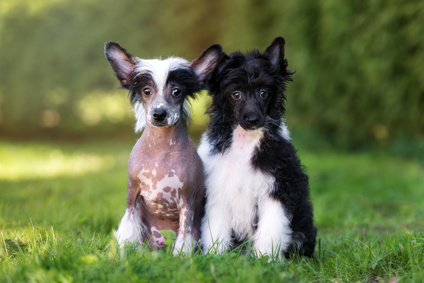
Small breed puppies may reach maturity by the end of this period of canine development, but for the large or giant breed puppies there is still a long way to go!
Some of the extra-large dogs don't become adult until they are
somewhere between 2 and 3 years old.
There will be a more noticeable difference between the development of small and large breed pups at this stage of development.
Small or tiny breeds should be starting to settle down in terms of behavior, and they will have reached their full height and weight.
Large or giant breeds will still be in the adolescent stage and there will be the same sort of behavior that you've been seeing for the last few months.
These big puppies will still have lots of growing to do. To get an idea of how big your puppy may be by the time he's fully grown (whether he's a small or large breed), check out my Puppy Weight Estimates page.
Your Puppy's Needs During the Sixth Stage of Development:
At this stage of development, your pup's greatest needs are for discipline, exercise, sturdy chew toys... and patience!
Puppies grow up much faster than human children, but don't expect miracles or overnight transformations. It's the small, day-in-day-out interactions, the consistent but loving corrections, the patience and persistence that win the day.
Your pup WILL learn, but he's a creature of habit and his learning style is much more of a gradual build-up of understanding than a sudden 'aha moment'. If you follow the guidelines here, it will work out fine in the end, just stick with it.
It's a good idea to get your puppy neutered (or if you have a female, have her spayed) during this period, recommendations generally say it's best to do this before your pup is 6 months old. I agree with this for small or medium breeds, but as a big-dog owner, I prefer to go with somewhere around 8 - 9 months for these surgeries.
As large and giant breeds mature more slowly than their smaller 'cousins', 8 - 9 months is about right in my opinion.
However, I would suggest that you discuss this with your own veterinarian and come to a decision that you're comfortable with.
Seventh Stage: 1 Year and Beyond
As I mentioned above, there won't be much change in terms of physical growth or maturation for small and tiny breeds after one year of age.
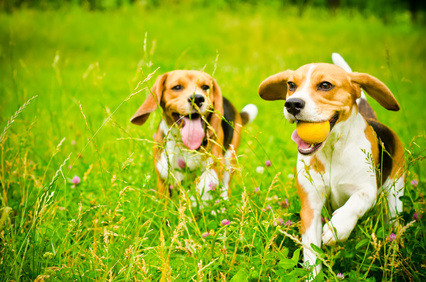
But because growth rates vary between smaller and larger breeds, this 'slow down' won't happen for large and giant breeds until somewhere between 18 months and 3 years of age, so they will still be growing.
Gaining their full height first, then continuing to put on
weight until they reach their full adult size.
In terms of behavior for large breeds you'll basically see more of the same teenage behavior, plus some noticeable growth spurts during this period of puppy development..
With guardian breeds this is when you'll start to see those instincts rise to the surface.
Pups of this age tend to be more combative with puppies or dogs of the same sex as themselves and during this stage of puppy development family squabbles may surface between dogs who have lived in the same house happily for months.
Your Puppy's Needs During the Seventh Stage of Development:
Many pups have no idea what to do with their guarding instincts when they first appear, and may try to act brave while hiding behind your legs. Again, normal and nothing to worry about. As your pup grows and matures these protective urges will mature with him and he'll learn the proper way to react.
NEVER, EVER encourage a pup to 'guard' or to act aggressively or defensively. That will confuse and frighten him and could cause a lot of problems later on. Be sure to correct him gently but firmly if he growls inappropriately though!
You can now switch your pup over from his puppy food to a premium dog food, as his nutritional needs are changing.
Your baby is an adult - at last! If you've spent time training and socializing your puppy and taken good care of his both his physical and emotional health, you can now breathe a sigh of relief! You have raised a happy, healthy and confident dog. Well done :)
you might also like...
- Home
- Puppy Development
FTC Disclosure: Some pages on this site contain affiliate links. I may earn on qualified purchases.

